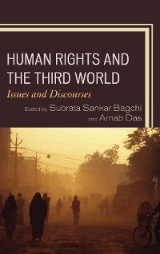Details

Human Rights and the Third World
Issues and Discourses|
67,99 € |
|
| Verlag: | Lexington Books |
| Format: | EPUB |
| Veröffentl.: | 06.12.2012 |
| ISBN/EAN: | 9780739177365 |
| Sprache: | englisch |
| Anzahl Seiten: | 406 |
DRM-geschütztes eBook, Sie benötigen z.B. Adobe Digital Editions und eine Adobe ID zum Lesen.
Beschreibungen
<span><span>Human Rights and the Third World: Issues and Discourses</span><span> deals with the controversial questions on the universalistic notions of human rights. It finds Third World perspectives on human rights and seeks to open up a discursive space in the human rights discourse to address unresolved questions, citing issues and problems from different countries in the Third World: </span></span>
<br>
<ol start="1">
<li><span>Whether alternative perspectives should be taken as the standard for human rights in the Third World countries? </span></li>
<li><span>Should there be a universalistic notion of rights for Homo sapiens or are we talking about two diametrically opposite trends and standards of human rights for the same species? </span></li>
<li><span>How far these Third World perspectives of human rights can ensure the protection of the minorities and the vulnerable sections of population, particularly the women and children within the Third World? </span></li>
<li><span>Can these alternative perspectives help in fighting the Third World problems like poverty, hunger, corruption, despotism, social exclusion like the caste system in India, communalism, and the like? </span></li>
<li><span>Can there be reconciliation between the Third World perspectives and the Western perspective of human rights? </span></li>
</ol>
<br>
<ol start="1">
<li><span>Whether alternative perspectives should be taken as the standard for human rights in the Third World countries? </span></li>
<li><span>Should there be a universalistic notion of rights for Homo sapiens or are we talking about two diametrically opposite trends and standards of human rights for the same species? </span></li>
<li><span>How far these Third World perspectives of human rights can ensure the protection of the minorities and the vulnerable sections of population, particularly the women and children within the Third World? </span></li>
<li><span>Can these alternative perspectives help in fighting the Third World problems like poverty, hunger, corruption, despotism, social exclusion like the caste system in India, communalism, and the like? </span></li>
<li><span>Can there be reconciliation between the Third World perspectives and the Western perspective of human rights? </span></li>
</ol>
<span><span>Human Rights and the Third World: Issues and Discourses</span><span> deals with the controversial questions on the universalistic notions of human rights. It finds Third World perspectives and seeks to open up a discursive space in the human rights discourse to address unresolved questions, citing issues and problems from different countries in the Third World.</span></span>
<span><span><span>Acknowledgments </span></span><br><span><span>Introduction: Human Rights and the Third World: Issues and Discourse, </span><span>Subrata SankarBagchi and Arnab Das </span></span><br><span><span>Part 1.</span><span> Global Human Rights Standards and the Third World</span></span><br><span><span>Chapter 1. Universal Claim and Postcolonial Realities: The Deep Unease over Western-centered Human Rights Standards in the Global South, </span><span>Marie-Luisa Frick</span></span><br><span><span>Chapter 2. Progressive Realization of the Right to Development in India, </span><span>Clarence J. Dias</span></span><br><span><span>Chapter 3. Development and Environmental Issues vis-à-vis Current Perspectives of Human Rights</span><span>, </span><span>Aniruddha Mukhopadhyay and Sayan Bhattacharya</span></span><br><span><span>Chapter 4. Human Rights and Corruption: The Case of Political Corruption and Opposition to Human Rights in Indonesia, </span><span>Agus Wahyudi</span></span><br><span><span>Part 2.</span><span> Politics of Human Rights from Third World Perspectives</span></span><br><span><span>Chapter 5. Human Rights and Indigenous Self-Government: The Taiwanese Experience, </span><span>Scott Simon and Awi Mona (Chih-Wei Tsai)</span></span><br><span><span>Chapter 6. Colonial Continuities, Neoliberal-Hegemony and Adivasi (Original Dweller) Space: Human Rights as Paradox and Equivocation in Contexts of Dispossession in India, </span><span>Dip Kapoor</span></span><br><span><span>Chapter 7. Hindutva Politics—Impact on Human Rights, </span><span>Ram Puniyani</span></span><br><span><span>Part 3. </span><span>Rights of the Marginalized </span></span><br><span><span>Chpater 8. Human Rights Violations in India: Exploring the Societal Roots of Marginality, </span><span>Debi Chatterjee</span></span><br><span><span>Chapter 9. </span><span>Media, Cultural Rights and the Third World</span><span>, </span><span>Pranta Pratik Patnaik</span></span><br><span><span>Chapter 10. The Fault Lines in Soviet-Style Accommodation of Minority Rights in Ethiopia, </span><span>Semahagn Gashu</span></span><br><span><span>Chapter 11. Human Rights and the Third World Other, </span><span>Subrata Sankar Bagchi</span></span><br><span><span>Part 4.</span><span> Rights for Children and Genders</span></span><br><span><span>Chapter 12. Culture and Issues of Rights to the Eyes of the Indians with ‘Other’ Self-Identities of Sexuality and Gender, </span><span>Arnab Das and Pawan Dhall</span></span><br><span><span>Chapter 13. Roots and Shoots of Female Feticide in Pockets of India—Lending Voice to the Voiceless,</span><span> Tushar Kanti Saha</span></span><br><span><span>Part 5.</span><span> Rights of the Disabled and Health </span></span><br><span><span>Chapter 14. The Rights of People Living with Disability in the Third World Context: The Zimbabwean Pentecostal Concept of ‘Curses and Blessings’ in the Light of Disability, </span><span>Francis Machingura</span></span><br><span><span>Chapter 15. The Indian Disability Rights Paradigm: The Reality versus Rhetoric, </span><span>Anuradha Saibaba Rajesh</span></span><br><span><span>Chapter 16. ‘People’s Health in People’s Hand’: Story of a Voluntary Organization in Rural West Bengal, </span><span>Satyabrata Chakrborty</span></span><br><span><span>Part 6.</span><span> Expanding Frontiers of Human Rights</span></span><br><span><span>Chapter 17. Human Rights and Information Society: Problematizing India, </span><span>Dipankar Sinha</span></span><br><span><span>Chapter 18. Biotechnology and Human Rights, </span><span>Subhasis Mukhopadhyay </span></span><br><span><span>Index</span></span><br><span><span>Notes on Contributors</span></span><br><span></span></span>
<span><span><br></span><span>Human Rights and the Third World: Issues and Discourses</span><span> deals with the controversial questions on the universalistic notions of human rights. It finds Third World perspectives on human rights and seeks to open up a discursive space in the human rights discourse to address unresolved questions in human rights, citing issues and problems from different countries in the Third World.</span></span>
<br>
<span></span>
<br>
<span></span>
<span><span><span>Subrata Sankar Bagchi</span><span> is an associate professor in the Department of Anthropology at Bangabasi Evening College, University of Calcutta, India. He is also teaching postgraduate courses of anthropology and human rights in the University of Calcutta, West Bengal State University, and Jadavpur University.</span></span><br><span></span><br><span><span>Arnab Das</span><span> is an associate professor in the Department of Anthropology, University of Calcutta. He also teaches postgraduate courses in human rights, museology, human resource management, anthropology, and rural development in West Bengal, India.</span></span><br><span></span></span>
Diese Produkte könnten Sie auch interessieren:

Identifying, Assessing, and Treating Autism at School

von: Stephen E. Brock, Shane R. Jimerson, Robin L. Hansen

96,29 €

How to Become an Effective Course Director

von: Bruce W. Newton, Jay H. Menna, Patrick W. Tank

64,19 €














